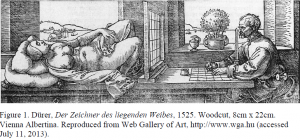Laura Hatch and Dr. Matt Ancell, Humanities, Classics, & Comparative Literature
I organized this research project in order to better understand the philosophical implications of linear perspective in Western Renaissance art. Artists and theorists have long understood linear perspective as a specific artistic technique, but my research was an exploration of what linear perspective represents in terms of how human beings construct and represent knowledge. By performing a phenomenological reading of German Renaissance artist Albrecht Dürer’s woodcut Draughtsman Drawing a Recumbent Woman (1525),1 it was my initial hope to show how this ubiquitous image could be read as a recognition of and exposure of linear perspective’s failure to capture and truly represent something as reality.
My initial readings of Dürer’s woodcut focused on the image as a commentary on the manipulative nature of linear perspective as a disembodied perfecting of imperfect, embodied experience. But when I turned to Heideggerian phenomenology, the concepts of being and tools that I had previously assumed would be supportive of my thesis, actually seemed to work against it. That is to say, by closely attending to Heidegger’s notions of how the world is constructed by beings-in-the-world, I realized that I, like many critics, was guilty of vilifying artistic perspective. With this new insight, I decided to return to the drawing board with linear perspective and to create a new thesis that would explore linear perspective not as a failed epistemology but rather an illuminative one that subtly exposed linear perspective as inherent to the heart of art’s aims to recreate lived experience. In my new thesis I examined Dürer’s woodcut through questioning the basic assumptions surrounding the nature of both naturally-occurring and artificial perspective. In approaching this image with questions regarding its portrayed equipmental nature and the relational positions of the subject and the object, a subtle, yet inherent paradox emerged. This paradox turned on Heidegger’s notion of the “givenness” of the natural world as it shapes the viewer and the givenness determined and assigned by the artist in his representation of that same natural world.
The work that I did for my ORCA project provided the basis for my honors thesis and throughout 2012-2013 I worked closely with my advisors, and produced and revised many drafts, culminating in the honors thesis and defense. I also had opportunities to present my research at the Utah Conference on Undergraduate Research (Utah State University) in February, 2013 and at the Western Regional Honors Council (Northern Arizona University) in April, 2013, both of which conferences provided me with chances to practice condensing material, to defend or to rethink my ideas on the spot, and to explain my ideas to an audience outside of my field. The ORCA grant provided me with a sustained period in which I could practice academic researching and writing, learn to develop better questions, and to work closely with faculty members. This experience was a highly enjoyable and valuable preparation for my current PhD studies in Comparative Literature at the University of California, Irvine. The questions and issues that I took up in this ORCA project are topics that I continue to work with today in my studies, and my current methodology is deeply shaped by the process and results of this research project. The nature of the topic of this project is something I am planning to incorporate into my dissertation and I am aiming to publish this research in the future.

